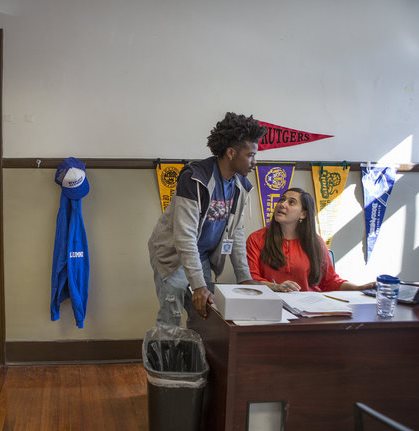KIPP grads get support from committed college counselor
ByDanielle Dreilinger
Read the full article at NOLA.com >
To hear KIPP Renaissance alumni talk, Scarlet Feinberg Cornelius is their fairy godmother. Whenever they need her, the KIPP Through College counselor swoops in.
“She helps me on a daily basis with college and making sure I graduate,” Bard College sophomore Jaleel Green said.
Cornelius talked Keishunn Johnson off the ledge when the lonely freshman wanted to transfer home from Howard University. She got Larionne Clark’s surprise housing bill at Loyola University reduced, then helped her transfer to Northwestern State. “If I have any problems on campus, I text Ms. Feinberg,” Clark said.
When they wonder if they’re in the wrong classes or the wrong university, Cornelius helps them focus on their career goal and puts the struggle into perspective.
And like any good fairy godmother, she sends gifts to students who moved away. “Zapp’s — that went a long way for me,” Green said.
Cornelius’ passion for helping students move into adulthood comes in part from her own life. For years, “I was so driven to do what other people were telling me to do,” she said.
The Bogalusa native grew up in a family of doctors and lawyers, where a bachelor’s degree wasn’t enough. She started college pursuing medicine, switched to business and planned to attend law school, though none of it felt right.
In a last-ditch attempt to delay law school and do something good for the world, she joined Teach for America and “fell in love with teaching,” Cornelius said. “It just became a no-brainer.”
Looking back, she realized she had tutored other students since high school and worked as a teaching assistant in college.
When her LSAT scores expired, meaning she couldn’t apply for law school, she threw a party.
A system of support
Given how close their relationships feel, Cornelius’ charges might be surprised to learn how much planning and standardization goes on between their crucial conversations. Her magic touch is based on a color-coded schedule, worksheets — and a drop of self-control on Cornelius’ part, to do less for students instead of more.
She didn’t start out that way. In 2014, Cornelius became the founding alumni counselor at KIPP New Orleans’ new college persistence program.
Calling that fall hectic would be an understatement. “It was always crisis mode and it felt like it was hanging from a thread,” she said.
She was overwhelmed, wishing for 18 hours more in the day while simultaneously feeling she had wasted time. She felt she was shorting the alumni whose lives weren’t blowing up.
Worse, it wasn’t working. Students floundered. They didn’t complete their action items because they knew she would. Parents got in touch, saying, “Ms. Feinberg, you said they’d be ready for college and they’re calling me crying.”
In Cornelius’ desire to “save and help everything,” she said, “I was failing at everything.”
So she stepped back, re-evaluated and began to develop a system. The materials have been so productive that KIPP Through College teams around the country have started using them, Cornelius said.
It starts with a calendar she develops every summer of key dates at all her advisees’ colleges. First she schedules a rotation of campus visits and phone calls. Then come newsletter due dates and staff meetings to plan events, assemble care packages and the like.
The regimentation has become especially crucial as KIPP’s alumni ranks have grown. Last year, Cornelius maintained ties with a whopping 189 students, calling one while driving to meet another. “I really love what I do. So it didn’t feel overwhelming,” she said.
Now it’s down to 102, while she also manages the KIPP Through College adviser program and supervises four other alumni counselors.
“I don’t have to solve every problem”
Three years in, Cornelius sees herself as a concierge, pointing students to resources.
“I don’t have to solve every problem,” she said.
The student has to do the legwork. She tells them to email her after they’ve contacted that professor. If they want feedback on a big paper, they have to send her the complete draft at least 48 hours in advance, “no matter how much I like the kid.”
Nor does she tell them what to do, even if they’re talking about dropping out: “If I push too far, it will backfire.” When that topic comes up, usually “they hadn’t thought it through,” she said. So she gives them information, discusses the pros and cons and hopes they’ll make what she sees as the rational, best choice. More often than not, they do.
The more contained role is better for the students, Cornelius said. Doing everything for them, “it’s not sustainable. It’s not what we want to teach. We want to teach students to own their journey.”
And it’s better for her. She and her husband aim for a solid three hours without work every night. She gets more than eight hours of sleep.
“I am constantly texting,” Cornelius admitted, but “I’ve set up boundaries.”
In fact, sometimes she purposely texts students back on the weekends or after hours so “I appeared always available,” she said. “Sometimes that was all the comfort kids needed.”
